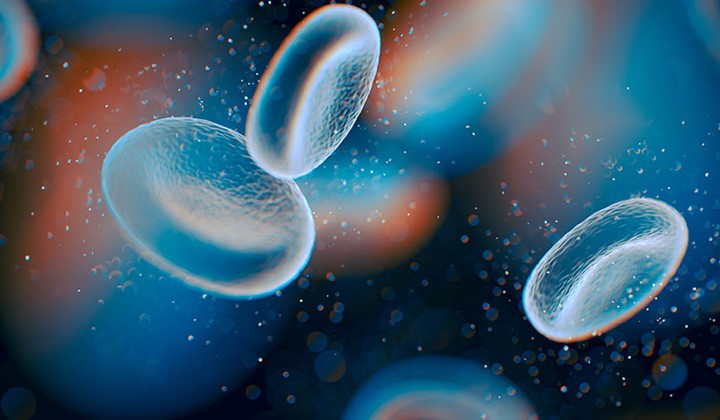Food intolerance - what does it actually mean?
Foodstuffs supply us with all the nutrients we need to live: these include carbohydrates, protein, fats, vitamins and minerals.
However, some food constituents or their metabolites can cause complaints such as headaches, digestive problems, itchy rashes or tiredness.

Food intolerance explained simply
Food provides us with all the nutrients we need to live: These include carbohydrates, proteins, fats, vitamins and minerals. However, certain components from food or their breakdown products can lead to conditions such as headaches, digestive problems, skin rashes with itching or fatigue in some people.

How does a food intolerance come about?
A food intolerance develops because the body does not have enough of the tools required to metabolize the constituents in food. These tools are called enzymes. They perform essential functions in the human body. For example, they break down large nutrients into small morsels, protect the body against harmful substances, heal wounds and much more. Yet many people are lacking in some of these tools: they suffer from an enzyme deficiency. There are various reasons for this. A changed lifestyle in today's society, new dietary habits and other external influences can reveal the lack of certain enzymes. It can also become apparent in the form of a food intolerance.

Do you feel unwell after eating certain foods? Do you experience other symptoms of food intolerance?

How does a food intolerance manifest itself?
Intolerance of individual foodstuffs can manifest itself in a variety of ways. The most common symptoms are stomach pain, digestive problems such as diarrhea, constipation or flatulence, headaches, rashes (often involving itching),dizziness or general fatigue and tiredness.

What is the difference between food intolerance and food allergy?
With a food intolerance, the body cannot metabolize certain constituents of the foodstuff. By contrast, in the case of an allergy, the immune system gets confused. Certain food constituents are incorrectly identified as “pathogens” due to a malfunction. The immune system fights these substances with an immune reaction that can be manifested by various symptoms. A food allergy can be diagnosed with appropriate antibody tests.
Typical symptoms of a food allergy:
- Watery eyes, runny nose due to swelling of the mucous membranes
- Shortness of breath
- Headaches
- Gastrointestinal complaints
- Dizziness
- Itchy rashes
A food intolerance can occur at any time. Often, it only develops over time. The complaints are frequently dose-dependent.This means that small quantities of the food concerned can be eaten without problems. Symptoms arise after consumption of large quantities, and often only after a certain amount of time.
Enzyme deficiency

What function do enzymes have?
Enzymes are everywhere in the body: they are contained in the blood (plasma enzymes), can be found in the cells (cell enzymes) or are released by the body cells so that they perform their function. Their tasks are correspondingly wide-ranging: they convert nutrients into energy and cell components, destroy toxins in the body absorbed from the environment, heal wounds and successfully defend us against diseases. Digestive enzymes are particularly important. Without them, neither vitamins, minerals nor hormones can fulfill their tasks. In short, our body would not work without them. Conversely, this means that if a specific enzyme is missing (either from birth or not until later in life), many health problems can arise.

Digestive enzymes - a brief overview
Digestive enzymes are among the most important enzymes. As their name suggests, they are involved in breaking down nutrients into small morsels. They are present in the intestine, for example, as well as in saliva, the pancreas and the stomach. Digestive enzymes specialize in specific nutrients. For instance, peptidases or proteases break down the protein in the food. By contrast, amylases are responsible for processing carbohydrates - they also include the enzyme lactase, which breaks down lactose. Another of the jobs of the enzymes in the digestive tract is to prevent us from ingesting food constituents that are not good for us. These protective enzymes include diamine oxidase, or the DAO enzyme for short. It ensures breakdown of excess histamine.

What are the symptoms of enzyme deficiency?
Enzyme deficiency can manifest itself in a variety of ways. Unfortunately, the complaints are fairly non-specific, i.e. they can also be caused by other disorders. The following symptoms can indicate an enzyme deficiency: gastrointestinal problems, headaches, skin changes, itching,asthma attacks, fever, depression, tiredness, hyperactivity, dizziness, high blood pressure, increased blood sugar, raised blood lipid levels or non-alcoholic fatty liver disease.The symptoms may occur individually or in various combinations, typically after consuming a particular foodstuff.

How can enzyme deficiency be treated?
If it is clear that a deficiency of specific enzymes is causing the complaints, there are two options. Firstly: stop eating the foodstuff that the body can no longer process properly or that it does not have sufficient protective mechanisms to fight against. There are lactose-free products for people with lactose intolerance, for instance. However, avoiding individual components of the diet entirely is not always feasible. For example, at a dinner party, when traveling or at a restaurant, you cannot always know for sure that the untolerated substance is not on your plate.
In such cases, it helps to add the missing enzymes (supplementation). Supplements of this kind help to alleviate complaints and improve quality of life. With their help, those affected can finally eat everything again. Bon appetit!













